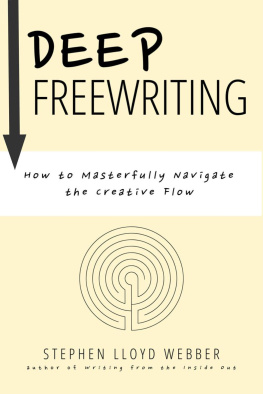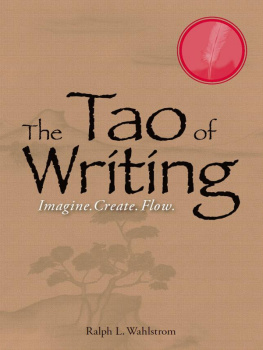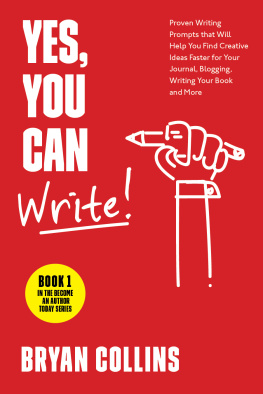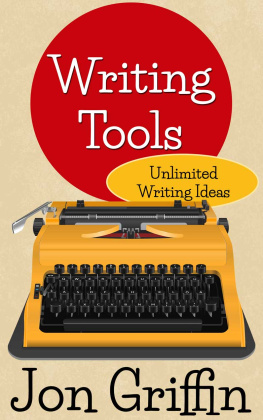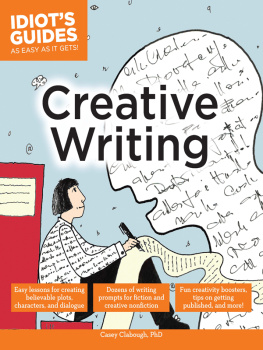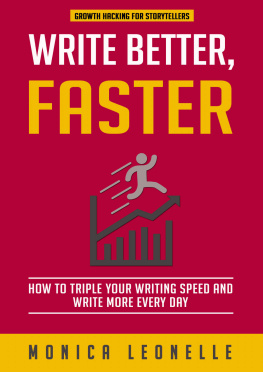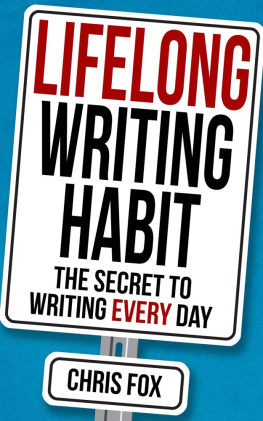Deep Freewriting
How to Masterfully Navigate the Creative Flow
STEPHEN LLOYD WEBBER

Apollo Star
Published by APOLLO STAR
apollostarbooks.com
An imprint of Publications Publishing LLC
1603 Capitol Ave
Suite 310 A147
Cheyenne WY 82001
(307) 222-6967, (307) 365-6456 (FAX)
Copyright 2020 by Stephen Lloyd Webber
All rights reserved. No part of this book may be reproduced in any form or by any means without permission in writing from the author, except for the inclusion of brief quotations in a review.
Table of Contents How to Use This Book
Treat this book like a course. Start at the beginning and move forward only after doing each exercise.
Everything in this book is here to help you make positive shifts with your writing. The key to making this happen is to ensure that you apply what is covered here. The material really becomes yours not from reading it but by experiencing results firsthand.
There are seven core modules. Try to spend an equal amount of time on each. A week per module, for example.
The first module is about dispensing with limiting beliefs, introducing key concepts and getting your feet wet.
The second module introduces some pivotal techniques that make your freewriting more organized and well-structured.
Module three brings in the importance of time, perspective, and the power of questions.
Module four is packed with different exercises and is all about diving into new possibilities, embracing the chaos of creation to get new ideas, explore voice, realize your goals, and how to shift modes to comfortably write for longer durations.
Module five delivers the main event, the heart of it all: the writing marathon. Along with that, there are a host of techniques and tweaks that will help you navigate the flow with ease.
Module six brings in the issue of revision and brings some key distinctions to make this phase of the writing process productive, fun, and creative.
Module seven is about reflection and offers additional strategies to further integrate depth freewriting into your life. It includes some writing recipes you can use depending on what you would like to write and how much time you have.
Thats the intended order, but nothing is set in stone. If you feel like skipping around, go for it. And if you have questions about anything or want one-on-one guidance, feel free to reach out to me at stephenlloydwebber.com
Module 1: Flow Why A New Method?
T he pace of life has quickened. We are surrounded by interruptions and demands for attention.
Its time to reclaim command of our creative time. Unless we embrace a more streamlined way to write, our best work will remain unwritten.
To get better, we need to go deeper.
Most of the time people spend writing is time wasted deliberating, procrastinating, and fighting with themselves.
As an English professor, I saw this inner struggle all the time when students took a written test. Despite the fact that I had taught freewriting to all of my students, not all of them kept up with it.
Some students really embraced freewriting and were able to write with no delays. They simply read their test questions and began to write. No head scratching, no chewing their pencil erasers. They had confidence. They didnt need to stare at the page, because they knew the page wasnt going to have the answers on it until they wrote them there.
So what about the rest of the students? They followed a common style of writing I call the blank stare style. As a result, it took them a lot longer to finish writing, and on average, the wording of their essays did not flow as smoothly as those written by the students who finished first.
The students who wrote fast were able to get into a flow. The other students never got into a flow, because they were blocked up about trying to get the right ideas on the page.
Im not going to say that hesitation is wrong, or that if someone needs to stop and think it means they dont know what theyre doing. I definitely dont mean that. Im also not passing judgment against people who write slowly.
Im sharing what I saw because it lays out a pattern I believe can make all the difference for those who want to write better, faster and more authentically.
The pattern I noticed was that in any given classroom full of writers, those who really embraced what I taught them about freewriting were able to consistently outperform the others.
The freewriters were not necessarily smarter than the writers who insisted on stopping to think. But they certainly showed greater confidence and flow when it came to completing their written exam.
Maybe you can relate to this. Confidence goes hand-in-hand with being in the flow state.
As a contrast, if you think back to moments when you felt blocked, when you stared dully at the blank page, fearful of saying something wrong, those werent exactly your lifes most confident moments. I can relate. Its hard to feel confident while losing a fight with yourself.
A freewriters confidence is a byproduct of an unblocked writing process. The more you embrace freewriting and use the technique to really go deep, the more you are able to trust your ability to write whenever you need to write something.
Its a simple technique with many diverse applications. Its also easy to learn.
Winning the Fight
Anyone who can write can freewrite, so why don't they? Why do people choose a writing method that makes them feel blocked and keeps them staring at their screens and fighting with themselves?
I dont think fighting with yourself is the path to greatness. When every word is a struggle, I dont think youre likely to be penning the next bestseller.
My experience has shown me that the regular practice of deep freewriting is the quickest way to form a winning relationship with writing. Deep freewriting is a versatile practice. Writers can use it to write better, to write faster, and to connect with their innate voice.
Freewriting in some form or another has been around for a long time, and the simple methods many people are already aware of generally work pretty well. But few people really push the technique to reap the biggest rewards from it.
Even though freewriting is simple, it has amazing depth and nuance to it. My advice is to push it by using the techniques I lay out in this book. There are ways of focusing a freewriting session to go from rough idea to finished draft in a very short time. You can make it work with any form of writing, whether creative, technical, for self-discovery, or to help get your point across to a potential client.
Simply by commiting to write without stopping, you are already well ahead of the curve. Most of the time people spend writing is time wasted deliberating and fighting with their own emotions, their inner critic, their own process. Likewise, much of the struggle with revision comes from frustration and confusion trying to wrestle their language and decipher their own meaning.
Take it from me. I have had my share of struggles as a writer. For many years, my writing process was way slower than it needed to be. Im no different than the average Joe in this regard. Actually, I may have even been slower than the average Joe, because I over-thought everything. It was only when I truly embraced freewriting by doing several particularly prolonged sessions (several hours to an entire day) that I was able to steamroll past my old blocks for good. I unlearned all sorts of bad habits, and once I finally deconstructed these bad habits, they never came back.
Comfortably freewriting for longer and longer durations is something we will cover in this book.
I want to share these freewriting techniques because I am crazy enough to believe that if more people are aware of them, I can help the world become a better place. Unblocked people can be more creative, innovative, and impactful. Unblocked people can become more of who they really are.
Next page
